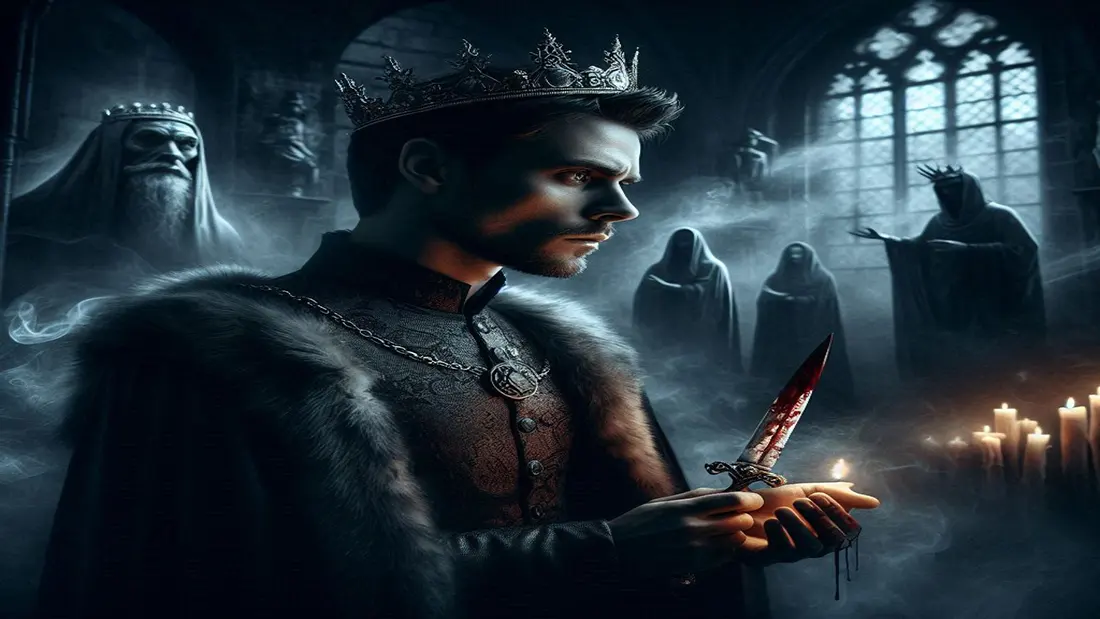Welcome to BD JOBZ PREPARATION, where we explore fascinating topics in literature and beyond. William Shakespeare’s play Macbeth is one of the most famous tragedies in English literature. The central character, Macbeth, is a complex figure who undergoes a significant transformation throughout the play. The character of Macbeth is both ambitious and tragic, making him one of the most memorable protagonists in Shakespeare’s works. His journey from a noble and valiant soldier to a ruthless and paranoid king reflects themes of ambition, fate, and moral corruption.
Read More: Macbeth Act 5 Summary
Character of Macbeth

William Shakespeare’s play Macbeth is one of the most famous tragedies in English literature. The central character, Macbeth, is a complex figure who undergoes a significant transformation throughout the play. The character of Macbeth is both ambitious and tragic, making him one of the most memorable protagonists in Shakespeare’s works. His journey from a noble and valiant soldier to a ruthless and paranoid king reflects themes of ambition, fate, and moral corruption.
Macbeth’s Initial Noble Character
At the beginning of the play, Macbeth is introduced as a brave and loyal soldier. He fights courageously for King Duncan of Scotland and earns high praise for his valor. The captain describes his battlefield heroics, and even King Duncan acknowledges his greatness by rewarding him with the title of Thane of Cawdor. This early portrayal of the character of Macbeth establishes him as a man of honor and integrity. He is not yet influenced by evil thoughts or the thirst for power. However, this noble side of Macbeth soon begins to change due to external influences.
The Influence of the Witches
One of the key turning points in the character of Macbeth occurs when he encounters the three witches. They greet him with three titles: Thane of Glamis, Thane of Cawdor, and future King of Scotland. While Macbeth initially doubts their words, their prophecy plants the seed of ambition in his mind. When he soon learns that he has indeed become the Thane of Cawdor, he starts believing that the rest of the prophecy might also come true. This moment marks the beginning of Macbeth’s internal conflict, as he struggles between his ambition and his moral conscience.
Lady Macbeth’s Influence
Macbeth’s wife, Lady Macbeth, plays a crucial role in his transformation. When Macbeth hesitates to kill King Duncan, Lady Macbeth questions his manhood and persuades him to commit the murder. She tells him that he must act ruthlessly if he wants to achieve greatness. Her words greatly influence him, and he eventually gives in to his ambition. The murder of King Duncan is the first major step in Macbeth’s downfall. He is no longer the honorable soldier he once was; he is now a man willing to commit heinous crimes to achieve his desires.
Macbeth’s Moral Decline
After killing King Duncan and taking the throne, Macbeth becomes increasingly paranoid. He fears that others might try to overthrow him, just as he overthrew Duncan. His fear leads him to commit more murders, including the killing of his close friend Banquo. The character of Macbeth continues to descend into darkness as he orders the murder of Macduff’s family, showing no remorse or hesitation. At this stage, he has completely transformed into a tyrant who is willing to kill anyone who threatens his position.
Macbeth’s Growing Isolation
As Macbeth commits more crimes, he becomes increasingly isolated. He loses the support of the Scottish nobles, and even his wife, Lady Macbeth, begins to lose her sanity due to guilt. Macbeth, however, becomes numb to emotions. He famously states that life is “a tale told by an idiot, full of sound and fury, signifying nothing.” This shows that he has reached a point where he no longer values human life. The character of Macbeth is now completely consumed by his ambition and paranoia.
Macbeth’s Tragic End
Despite his efforts to secure his throne, Macbeth’s downfall is inevitable. The witches’ prophecy tricks him into believing that he is invincible, but he soon realizes that he has been deceived. When Macduff confronts him in battle, Macbeth learns that Macduff was not “born of a woman” in the usual way, fulfilling the prophecy that he should fear such a man. Macbeth fights bravely but is ultimately killed. His tragic end serves as a lesson about the consequences of unchecked ambition and moral corruption.
Read More: Macbeth Act 4 Summary
The character of Macbeth is a powerful example of how ambition can lead to destruction. He starts as a noble warrior but becomes a ruthless tyrant due to his desire for power. His journey is marked by internal conflict, external manipulation, and an increasing detachment from morality. In the end, Macbeth’s ambition leads to his downfall, proving that unchecked desire for power often results in tragedy. Shakespeare’s portrayal of Macbeth remains a timeless reminder of the dangers of excessive ambition and the consequences of moral decay. For more insightful literary discussions, stay tuned to BD JOBZ PREPARATION.



